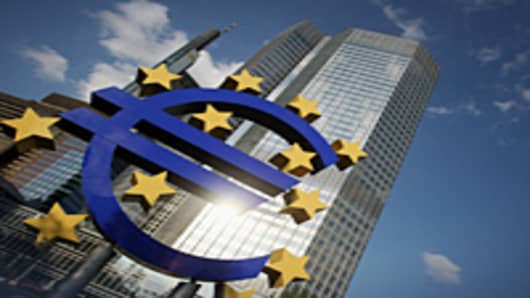The European Central Bank is widely expected to leave interest rates on hold on Thursday, reassured by signs that the economy started 2012 on a brighter note and hopeful that more cheap loans to banks at the end of this month will get them lending to each other again.
European Central Bank President Mario Draghi said after a press conference in January when the ECB left rates on hold at 1 percent that there were signs of stabilization for the economy.
“Draghi has been proven right over the past three weeks when he spoke of ‘tentative signs of stabilization’,” Carsten Brzeski, economist at ING told CNBC.com.
Many analysts thought his comments overly optimistic, but the confidence indicators in January do indeed point to stabilization, Brzeski said, adding that the stock markets were also performing well.
And a second long-term refinancing operation (LTRO) on Feb.29 could offer further relief for financial markets and eventually boost the real economy, the ECB hopes.
In December, the ECB's first three-year LTRO saw banks take up loans worth a total of 489 billion euros ($649 billion) and analysts have said that the drop in yields at auctions of debt from various euro zone countries since then was due to the increased liquidity.
Banks have become increasingly reluctant to lend to each other, afraid that their counterparty might be heavily exposed to sovereign euro zone debt and at risk of default.
Instead, they prefer to borrow from the ECB, which has stepped up lending to avoid a credit crunch, experts said.
“The problem is not that people and companies don’t want to borrow at current low interest rates. The challenge is that banks are not lending,” Carl Weinberg, Chief Economist at High Frequency Economics said.
“Textbook economics suggests that the central bank lowers interest rates to increase the demand for credit and stem economic contraction. That textbook is useless,” he said.
Since banks, under pressure to restore their balance sheets, are not lending, he believes the ECB cannot do much at this point.
The ECB will “stand back and watch” until at least June, he said, but in the meantime the economy will “contract hard”.
Analysts at Barclays and FxPro also expect the ECB to leave rates at 1 percent and expect Draghi to reiterate his relatively upbeat stance on the economy.
“I don’t see him signaling more rate cuts to come," Simon Smith, Chief Economist at FXPro said.
ING does not expect another rate cut before the second quarter of 2012.
Greek Elephant in the Room
One subject Draghi will doubtlessly need to address at Thursday’s press conference is Greece, and in particular whether the ECB is prepared to make concessions over its holdings of Greek government bonds to help reduce Greece’s debt burden.
“The main preoccupation of the Governing Council is likely to concern the scope for participation in a write-down of its holdings of Greek debt subsequent to private sector involvement,” Barclays analysts said in a note to clients.
The Wall Street Journal cited sources as saying on Wednesday that the ECB had agreed to exchange Greek government bonds last year at prices “below face value”. It said the ECB had declined to comment.
“The big question is whether he (Draghi) says anything about the contribution the ECB will make to the Greek restructuring,” Brzeski said.
Greek leaders failed to agree on new austerity measures in talks which dragged on into the early hours of Thursday morning. Finance minister Evangelos Venizelos is due to meet his euro zone counterparts at a meeting in Brussels later on Thursday.



